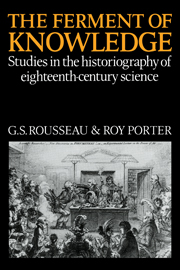Book contents
- Frontmatter
- Contents
- Contributors
- Acknowledgements
- Abbreviations
- Introduction
- PART I PHILOSOPHY AND IDEAS
- PART II LIFE AND ITS ENVIRONMENT
- PART III THE PHYSICAL WORLD
- 8 Mathematics and rational mechanics
- 9 Experimental natural philosophy
- 10 Chemistry and the chemical revolution
- 11 Mathematical cosmography
- 12 Science, technology and industry
- Index
9 - Experimental natural philosophy
Published online by Cambridge University Press: 03 May 2010
- Frontmatter
- Contents
- Contributors
- Acknowledgements
- Abbreviations
- Introduction
- PART I PHILOSOPHY AND IDEAS
- PART II LIFE AND ITS ENVIRONMENT
- PART III THE PHYSICAL WORLD
- 8 Mathematics and rational mechanics
- 9 Experimental natural philosophy
- 10 Chemistry and the chemical revolution
- 11 Mathematical cosmography
- 12 Science, technology and industry
- Index
Summary
During the eighteenth century natural philosophy - or fisica, physique, physica, Naturlehre - broke loose from the place in the organization of knowledge that it had occupied since antiquity. The scientific revolutionaries of the seventeenth century, however much they altered the principles and doctrines of physics, had left it with the purpose, method and coverage assigned to it by Aristotle. Eighteenth-century ferments decomposed and recombined it, drove off old parts, fixed new ones, and restructured its bonds with the body of knowledge.
We do not find an answering ferment among historians of eighteenth-century physics. That is not because they are few or idle. Perhaps as many as one historian of science in ten works on eighteenthcentury physics. Almost 10 per cent of the articles published during the past twenty years in the leading general journals - Isis and Revue d'histoire des sciences - concern the subject. About one half of these articles relate to experimental physics and the making of instruments. These figures are representative. Over the past fifty years the moderate but sustained investigation of eighteenth-century experimental physics has produced over 300 books and papers that are noticed in the Isis lists or in the bibliographies in the Dictionary of Scientific Biography.
This literature contains much information of great value. But it offers little in the way of helpful generalization or periodization.
- Type
- Chapter
- Information
- The Ferment of KnowledgeStudies in the Historiography of Eighteenth-Century Science, pp. 357 - 388Publisher: Cambridge University PressPrint publication year: 1980
- 10
- Cited by



